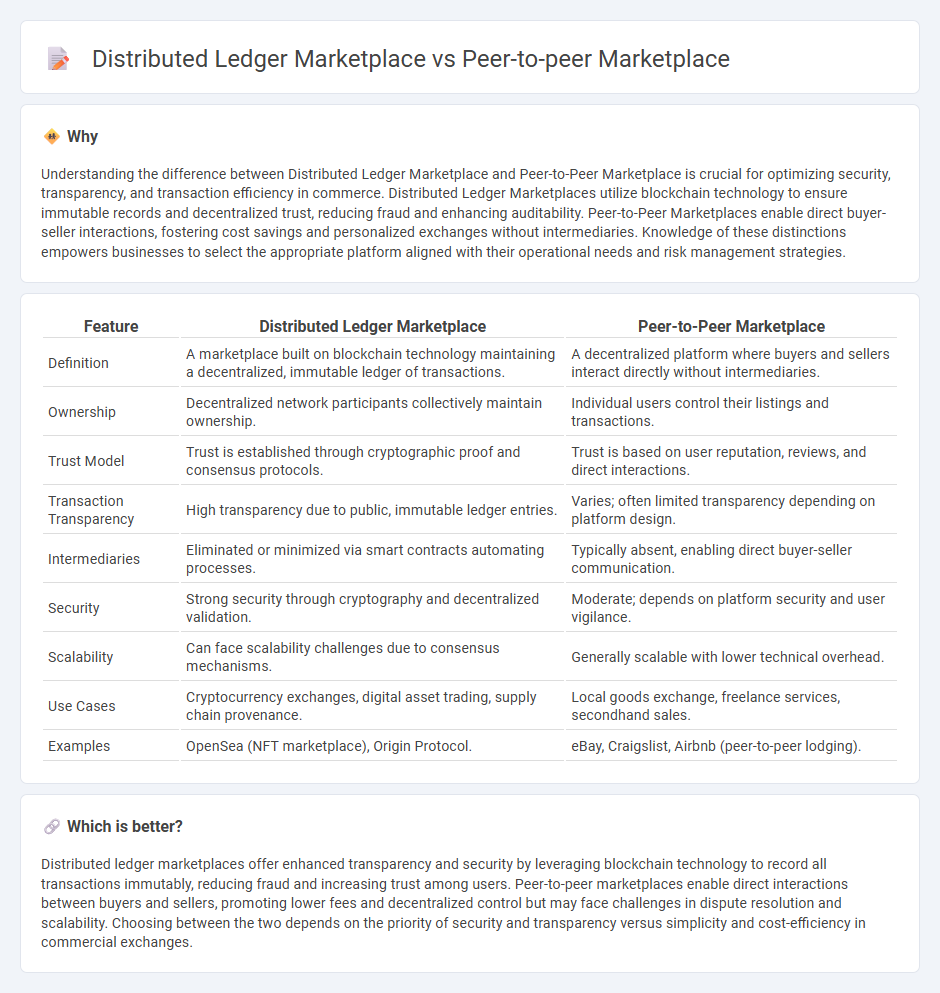
Distributed ledger marketplaces leverage blockchain technology to provide decentralized, transparent, and tamper-resistant transaction records, enhancing trust and security among participants. Peer-to-peer marketplaces enable direct transactions between users without centralized intermediaries, offering increased control and reduced fees but with varying degrees of trust mechanisms. Explore the differences and benefits of each model to understand their impact on the future of commerce.
Why it is important
Understanding the difference between Distributed Ledger Marketplace and Peer-to-Peer Marketplace is crucial for optimizing security, transparency, and transaction efficiency in commerce. Distributed Ledger Marketplaces utilize blockchain technology to ensure immutable records and decentralized trust, reducing fraud and enhancing auditability. Peer-to-Peer Marketplaces enable direct buyer-seller interactions, fostering cost savings and personalized exchanges without intermediaries. Knowledge of these distinctions empowers businesses to select the appropriate platform aligned with their operational needs and risk management strategies.
Comparison Table
| Feature | Distributed Ledger Marketplace | Peer-to-Peer Marketplace |
|---|---|---|
| Definition | A marketplace built on blockchain technology maintaining a decentralized, immutable ledger of transactions. | A decentralized platform where buyers and sellers interact directly without intermediaries. |
| Ownership | Decentralized network participants collectively maintain ownership. | Individual users control their listings and transactions. |
| Trust Model | Trust is established through cryptographic proof and consensus protocols. | Trust is based on user reputation, reviews, and direct interactions. |
| Transaction Transparency | High transparency due to public, immutable ledger entries. | Varies; often limited transparency depending on platform design. |
| Intermediaries | Eliminated or minimized via smart contracts automating processes. | Typically absent, enabling direct buyer-seller communication. |
| Security | Strong security through cryptography and decentralized validation. | Moderate; depends on platform security and user vigilance. |
| Scalability | Can face scalability challenges due to consensus mechanisms. | Generally scalable with lower technical overhead. |
| Use Cases | Cryptocurrency exchanges, digital asset trading, supply chain provenance. | Local goods exchange, freelance services, secondhand sales. |
| Examples | OpenSea (NFT marketplace), Origin Protocol. | eBay, Craigslist, Airbnb (peer-to-peer lodging). |
Which is better?
Distributed ledger marketplaces offer enhanced transparency and security by leveraging blockchain technology to record all transactions immutably, reducing fraud and increasing trust among users. Peer-to-peer marketplaces enable direct interactions between buyers and sellers, promoting lower fees and decentralized control but may face challenges in dispute resolution and scalability. Choosing between the two depends on the priority of security and transparency versus simplicity and cost-efficiency in commercial exchanges.
Connection
Distributed ledger marketplaces and peer-to-peer (P2P) marketplaces are interconnected through blockchain technology, enabling secure, transparent transactions without intermediaries. Distributed ledgers provide an immutable record of all trades and contracts, enhancing trust and reducing fraud risks in P2P marketplaces. This integration facilitates decentralized commerce ecosystems where buyers and sellers engage directly with increased efficiency and accountability.
Key Terms
Source and External Links
Peer-to-peer marketplace guide: How to launch, grow, and scale ... - A peer-to-peer (P2P) marketplace is a website connecting product or service owners with buyers or renters, offering an affordable and scalable business model with significant growth potential in the sharing economy.
How to Build a Peer-to-Peer Marketplace Platform, 2025 | Clarity - P2P marketplaces reduce startup costs by enabling individuals to buy and sell directly, extend market reach globally, respect user privacy, and foster community-building within niche markets.
Mastering Peer-to-Peer Marketplace Dynamics: A Comprehensive ... - Peer-to-peer marketplaces span sharing economy platforms like Airbnb, service marketplaces like Uber and Etsy, and product exchanges like eBay, each facilitating direct connections between suppliers and consumers across diverse niches.
 dowidth.com
dowidth.com